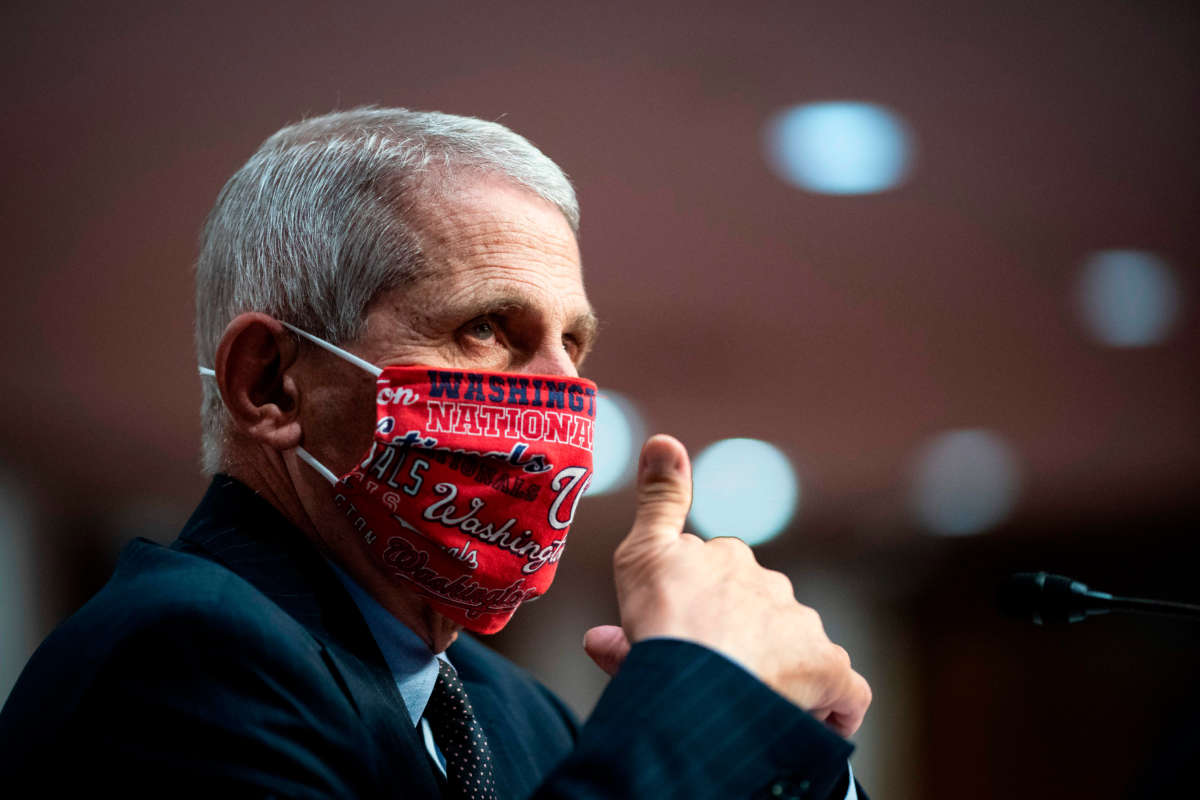Speaking during a Facebook Live event on Tuesday, Anthony Fauci, director of the National Institute of Allergy and Infectious Diseases and a member of the White House’s coronavirus task force, seemingly contradicted notions put forth by President Donald Trump about the death rates from the disease.
Trump, also on Tuesday, had earlier tweeted a Washington Times report by Valerie Richardson, and dubiously claimed that the mortality rate from COVID-19 in the United States had dropped “tenfold.”
Trump made other unfounded claims about the nation’s recent numbers on the disease.
“We have the lowest Mortality Rate in the World. The Fake News should be reporting these most important of facts, but they don’t,” Trump said in his social media post.
The president repeated the line on Tuesday evening as well. “Death Rate from Coronavirus is down tenfold!” he wrote in a tweet that he later deleted.
The “tenfold” decrease in death claims seems to have originated from Trump’s own press secretary, Kayleigh McEnany, who made note during a press briefing earlier this week that numbers were down.
“What the president is noting is that at the height of this pandemic we were at 2,500 deaths per day. We are now at a place where on July 4 there were 254. That’s a tenfold decrease in mortality,” McEnany said.
However, looking at the seven-day average in COVID-19 deaths rather than at the number for a single day demonstrates a different story. That average, on July 7, was at about 547 deaths per day, while on April 17 the seven-day average had been 2,232 deaths per day — a fourfold decrease, not a tenfold one.
It’s also worth noting that the number of recorded COVID deaths for July 7 was 957 — an almost four-fold jump from the number of deaths recorded just three days earlier on July 4 and which figure had been used by McEnany to illustrate her dubious claim about the sharp decrease in COVID-related deaths.
Fact checking on Trump’s tweets on Tuesday further reveals that the limited amount of testing available makes understanding of the actual death rate difficult to comprehend. However, according to reporting from CNN, of the 20 countries most affected by COVID-19, at least 14 others have lower death rates than the U.S. does at this time.
The virus is also seeing a resurgence in a number of states, with three in particular recording higher daily death counts than ever before. On Tuesday, Arizona announced 117 had died from coronavirus; Texas announced 60 new deaths, while Mississippi saw 44 perish from the disease.
More deaths across the country are expected, according to models the White House has relied upon in the past. The University of Washington’s Institute for Health Metrics and Evaluation (IHME) predicts that more than 70,000 additional deaths could come about due to the coronavirus by November 1 — though, if 95 percent of the population wore masks or facial coverings, that number could decrease by 45,000, researchers say.
But the focus on deaths is the wrong way to go, Fauci said on Tuesday while speaking online during the event hosted by Democratic Sen. Doug Jones of Alabama. COVID-19 is worth worrying over for more reasons than just the potential death count, he explained.
“It’s a false narrative to take comfort in a lower rate of death. There’s so many other things that are very dangerous and bad about this virus. Don’t get yourself into false complacency,” Fauci warned.
Indeed, for many patients, the fight with the disease lasts longer than most people may think. Some patients who have had serious bouts with coronavirus are still recovering two or three months after having been discharged from the hospital, and are only at a fraction of being at the place they were at, health-wise, before they contracted the virus.
The long term impacts of COVID-19 are not yet known, many doctors say.
“What will this lead to? How many [coronavirus patients] will recover completely, and how many of them will continue to have impairment? We do not know,” Farha Ikramuddin, chief of rehabilitation services at M Health Fairview, said in an interview with Minnesota Public Radio. “The amount of inflammatory response that [the virus] creates that causes significant damage in various organs of our body is unprecedented.”
Asymptomatic carriers of the virus could suffer harm from COVID-19, too. A study published in Nature Medicine last month found that those testing positive for coronavirus but showing no observable symptoms of it could still develop minor lung inflammation as a result, similar to what patients who have walking pneumonia exhibit. More study is needed to tell if these patients might develop serious issues further down the road.
As of 2 p.m. Eastern Time on Wednesday, more than 3 million cases of coronavirus have been identified in the United States, with more than 131,000 deaths recorded as well.
Media that fights fascism
Truthout is funded almost entirely by readers — that’s why we can speak truth to power and cut against the mainstream narrative. But independent journalists at Truthout face mounting political repression under Trump.
We rely on your support to survive McCarthyist censorship. Please make a tax-deductible one-time or monthly donation.
